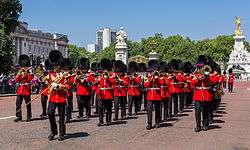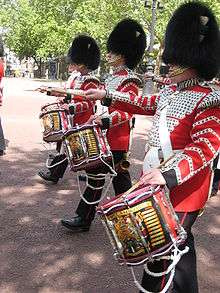Band of the Welsh Guards
The Band of the Welsh Guards is the youngest[1] of the five bands in the Foot Guards Regiments in the Household Division which primarily guards the British monarch.
Welsh Guards Band | |
|---|---|
 | |
| Background information | |
| Also known as | Band of the Welsh Guards |
| Origin | Wales, United Kingdom |
| Website | Home of the Welsh Guards Band |
Band membership duties
Musicians currently in the band have secondary roles in the British Army as Chemical Decontamination Assistants, Medics and Drivers.
The band is based at Wellington barracks in St James's London.[2]
Regimental Marches
The Regimental Quick March is the Rising of the Lark.
The Regimental Slow March is Men of Harlech,
History
The Welsh Guards Band was formed in 1915,[3] the same year as the regiment. Unlike other Guards Bands such as that of the Grenadier Guards, the band consisted of 45 people, including a Warrant Officer at the time of its inception, with the instruments having been bought by funds provided by the City of Cardiff.[3]
Because the Welsh Guards Band was formed hundreds of years[4] after military music for ceremonial purpose first arose, high standards had already been set by other Guards ensembles. They first publicly performed proving their worth on March 1, 1916, when they Mounted the King's Guard.[5]
The Welsh Guards Band started its touring career in 1917, early after its formation.[3] In recent years tours have taken the band to European countries such as Belgium and Spain; North America, with tours to the United States and Canada, and a recent tour to Egypt took the band to northern Africa.[5] The band's first commissioned Bandmaster; Lieutenant Harris;[3] was gazetted on March 1, 1919,[3] to the rank of Lieutenant, after serving with the band in his original position for nearly four years. He remained linked with the band until his retirement.[3]
By 1948 there was a new bandmaster, Leslie Statham who was famed for his compositional prowess by both his real name, and his assumed name Arnold Steck.[3] Under his leadership the band played extensively in Canada to large numbers of people, possibly well over one million,[3] whilst performing hundreds of different items. It is thought that this was off the back of the fact that the Bandmaster had performed at venues visited by the band before as a soloist from the Army School of Music Band, at Kneller Hall. Busy Canadian touring was the start of a long tradition of visiting other countries to play. The most notable tour after this one however, was in 1965, where they visited Milan, to play at "British Week", and were accompanied by the "Pipes, Drums and Dancers" of the Scots Guards for a long tour to America two years later.[6]
The band was honoured with playing at the Investiture of Prince Charles as Prince of Wales in July 1969.[6]
In the early 1970s, at the Band's pinnacle of success so far, in fields such as record contracts and appearances at sporting events, Major Desmond Walker died suddenly only weeks before the Band's planned departure for another Canadian and USA tour. The Tour went ahead as a new Director of Music was hastily appointed in the form of Captain Derek Taylor.[3]
During the 1980s the band continued to tour and to build on its successes, touring to Seattle, Australia, Japan, and Paris Vigo, Spain amongst other places. In 1990, the Welsh Guards Band had its first Director of Music, to be promoted to the rank of Lieutenant-Colonel in Peter Hannam, who two years later gained an MBE, and retired in 1993, as the last National Serviceman in Army Music.[3]
The Current Director of Music was appointed to the Welsh Guards after serving with a number of other bands in 2005 and has earnt the Alf Young Memorial Prize for Best Church Service, whilst on his Student Bandmasters' Course.[5]
Ensembles

There are several ensembles within the band of the Welsh Guards:
- Concert band
- Marching band
- Dance Band[7]
- Fanfare Team[7]
- Salon Orchestra[7]
Events
The band of the Welsh Guards plays regularly for occasions and events.[5] Some of these events that are most famous are listed below, although this is not a comprehensive list.
- Changing of the Guard
- The Festival of Remembrance
- Trooping the Colour
- Beating the Retreat
The band also performs at other non-military events, including numerous radio and television appearances. The band can be seen near the beginning of the 1956 film, Around the World in 80 Days (even though the film is set several decades prior to the band's formation).
Key personnel
- Director of Music: Major Stewart Halliday
- Bandmaster: WO2 David Hatton
- Band Sergeant Major: WO2 Karl Bailey
See also
- Coldstream Guards Band
- Grenadier Guards Band
- Irish Guards Band
- Band of the Scots Guards
- Household Division
References
- "Unofficial Welsh Guards Band History". Archived from the original on 14 May 2008. Retrieved 2008-05-27.
- "Welsh Guards Band Home". Retrieved 2008-05-27.
- "Unofficial history of Welsh Guards band". Archived from the original on 14 May 2008. Retrieved 2008-05-27.
- Grenadier Guards Band, History Section
- "Official Home of the Welsh Guards band". Retrieved 2008-05-27.
- Collins, Irma H. (2013). "Dictionary of Music Education". Scarcrow Press. p. 24. ISBN 978-0810886513.
- "About the Band". Retrieved 2009-09-27.